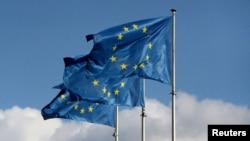Speaking to reporters prior to their meeting, EU's migration commissioner Ylva Johansson said, "it's important that those individuals that could cause a security threat to our citizens be returned forcefully, immediately."
"We need to be more efficient, close the loopholes and be quicker on decisions to carry out returns," Johansson added.
Abdesalem Lassoued, a 45-year-old Tunisian gunman that killed two Swedish football fans on Monday in Belgium's capital, Brussels, stayed in the European nation illegally for two days after his asylum request was denied.
Lassoued reached Europe via the Italian island of Lampedusa in 2011 and also lived in Sweden. He was shot dead by Belgian police.
The attack in Brussels underlined persistent failings of the EU's troubled migration and asylum systems, including security gaps and ineffective returns.
Only about a fifth of people whose asylum cases fail in Europe are actually sent away.
Speaking upon arrival to the EU meeting, Gerald Darmanin, France's Interior Minister said "we realize there's still a bit naivety either in the institutions of some countries or in the EU."
The French authority further called for the swift implementation of much-discussed EU migration rules, and for faster decisions on asylum requests.
Proponents of this looming overhaul of the EU's migration policies - expected to be finalized this year - argue it would improve the situation, including by facilitating quicker repatriations of foreigners with criminal records.
Thursday's meeting will also be the ministers' first chance to exchange views in person since the Oct. 7 attack on Israel by Hamas militants, resulting in the death of at least 1,400 people mostly civilians, and foreign nationals.
The ministers are not expected to take any specific decisions but will discuss topics including what particular developments could cause Palestinians to flee in large numbers, or trigger violent acts inside the bloc.
There is also a new push for deals with African countries - including Egypt and Morocco - akin to the one the EU has sealed with Tunisia, offering aid in exchange for Tunis bringing down departures for Europe.
Critics of the EU's new migration and asylum policies doubt they would be effective and point to growing risks to human rights while focus is on deterring unauthorized immigration.
The EU, a bloc of 450 million people, recorded approximately 250,000 irregular arrivals this year, in large part aided by smugglers.

Forum